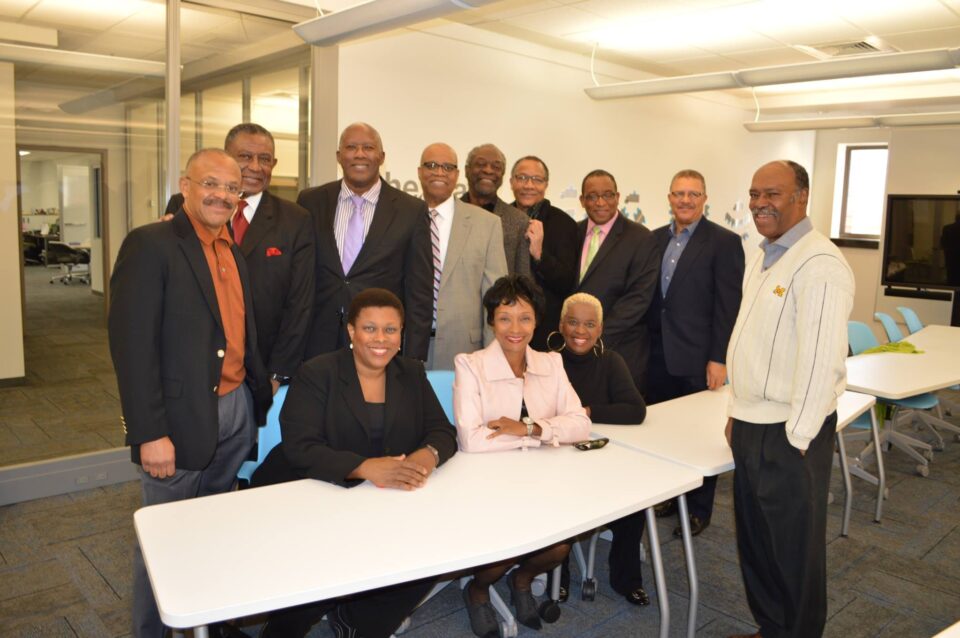Black Columnists Counter the Microaggressions
Homepage photo: Askia Muhammad is second from left as The Trotter Group of African American columnists meets in Jackson, Miss., in 2014. From left, Joe Davidson, Askia Muhammad, Wayne Dawkins, Rodney Brooks, Les Payne, Monroe Anderson, Randall Pinkston, DeWayne Wickham and Richard Prince. Seated, Rochelle Riley, Tonyaa Weathersbee and Betty Baye. (Credit: Alma Martin Gill)
Photos from Journal-isms Roundtable sessions by Sharon Farmer/sfphotoworks, except image of Kevin Blackistone, by Don Baker Photography.
Support Journal-ismsDuring WPFW-FM’s “Sweet Memories: A 24-hour Askia Muhammad Birthday Celebration,” columnist Mary C. Curtis said, “He was unapologetic. He was speaking to an audience of Black people primarily, and really wasn’t looking toward the approval of the white gaze. And he brought a lot to the conversation. He had the trust of the community in many ways, and he illuminated parts of the community that often didn’t get exposure in so-called mainstream media, and I really always appreciated that. And as Barbara Reynolds has said, he was an incredible gentleman. . . .”
Black Columnists Counter the Microaggressions
Columnist Barbara Reynolds remembers the Iranian hostage crisis of 1979 and 1980, when she got a tip that the activist Dick Gregory, visiting that country, had talked with Ayatollah Ruhollah Khomeini. Khomeini’s followers were holding hostage more than 50 Americans in the U.S. Embassy for what became 444 days.
Reynolds got the story into her paper, the Chicago Tribune, only to have the story killed. “I remember being so outraged that I even called the publisher of the paper at his home, and said, ‘What happened to this story?’
“And they said, ‘I just don’t think it’s important’. I mean, he’s the only one talking to the ayatollah, at a time they were holding these Americans in hostage! But what it was, they wanted someone white to have that issue. . . . They didn’t want Dick Gregory to be a hero of the hour.”
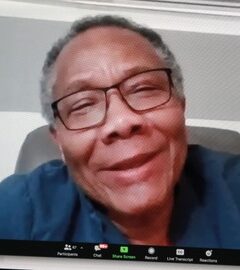 In 1975, Monroe Anderson (pictured), also at the Tribune, learned of the death of Elijah Muhammad, the mentor of Malcolm X who led the Nation of Islam from 1934 until his death and catapulted the Nation into the headlines in the process.
In 1975, Monroe Anderson (pictured), also at the Tribune, learned of the death of Elijah Muhammad, the mentor of Malcolm X who led the Nation of Islam from 1934 until his death and catapulted the Nation into the headlines in the process.
The Tribune gave Anderson seven column inches to write the story, he recalled.
Their complaints were part of a larger issue: “You would read the paper, you’d say, ‘Where are we?’ ” Reynolds said, referring to Black people and their achievements.
Since the 2020 murder of George Floyd by Minneapolis police, journalists of color have been sharing with the wider public the racial microaggressions they had long discussed among themselves.
They had various ways of coping, some after a cost to their own mental health, but others in a way that benefited all of us.
They became columnists.
“I started writing columns because I needed a healthy, legal conduit for my rage,” said Michael Paul Williams (pictured, below), who won the 2021 Pulitzer Prize for commentary for his work at the Richmond (Va.) Times-Dispatch.
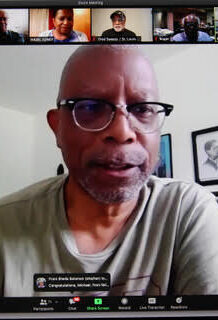 Williams, Anderson and Reynolds were part of a radio version of the Journal-isms Roundtable on March 28, the birthday of Askia Muhammad, columnist for the Final Call, the Nation of Islam’s newspaper, and the Washington Informer, and news director and program host at Washington’s progressive “jazz and justice” station, WPFW-FM, which is part of the Pacifica chain.
Williams, Anderson and Reynolds were part of a radio version of the Journal-isms Roundtable on March 28, the birthday of Askia Muhammad, columnist for the Final Call, the Nation of Islam’s newspaper, and the Washington Informer, and news director and program host at Washington’s progressive “jazz and justice” station, WPFW-FM, which is part of the Pacifica chain.
Muhammad died Feb. 17, and the station paid tribute on his birthday with 24 hours of discussion and music. It was a provocative tour de force that included replays of Muhammad’s interviews with novelist Walter Mosley; White House correspondent April Ryan; anti-racist scholar Ibram X. Kendi; Greg Carr, Howard University’s Afro-American studies chair, and clips from Muhammad’s reporting, including interviews with residents of the Gullah-Geechee islands who are affected by climate change.
The Gullah-Geechees maintain their African heritage as they live in the coastal areas and the sea islands of North Carolina, South Carolina, Georgia and Florida. Congress has designated it a National Heritage area, though the group doesn’t receive much national attention.
Muhammad, a member of the Nation of Islam, wrote from a decidedly Black perspective, which might explain why, while a tribute to him shortly after his passing was broadcast in three cities, his death has yet to be reported in his hometown newspaper, The Washington Post.
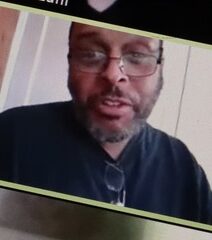 “He was all about narrative, and he was all about Black narrative,” said Todd Steven Burroughs (pictured), public historian, media consultant and contractor, Black press historian. “He was able to balance both the mainstream and the alternative [media] but always with Black people as the focus. . . . “
“He was all about narrative, and he was all about Black narrative,” said Todd Steven Burroughs (pictured), public historian, media consultant and contractor, Black press historian. “He was able to balance both the mainstream and the alternative [media] but always with Black people as the focus. . . . “
Participating in the two-hour discussion (video), moderated by this columnist, were Burroughs; Anderson, Chicago “cyber columnist”; Kevin B. Blackistone, Washington Post sports columnist, journalism professor at the University of Maryland, and ESPN panelist; Mary C. Curtis, columnist for Roll Call and contributor to public radio’s WFAE-FM in Charlotte, N.C.; Courtland Milloy, Metro columnist, Washington Post; Reynolds, a former columnist for USA Today and the Chicago Tribune; and Williams.
The discussion took place the afternoon after Will Smith’s now-infamous Oscar-night slap of presenter Chris Rock after Rock’s tasteless joke about Smith’s wife, Jada Pinkett Smith. Two scheduled columnists had to cancel their participation so they could write about it on deadline.
Already, there were fears that the public encounter between two Black men wouldn’t receive the nuanced analysis that Black columnists could give.
“When I see a lot of the white commentators’ reaction, it is very simplistic,” Curtis said. “It is, they should have put him [Smith] in handcuffs and arrested him, he assaulted someone; I’ve seen the ‘that’s how Black men do, they fight’; but it is complicated . . . Black columnists can bring a certain amount of life experiences, nuance and questioning assumptions and a different view, and so that’s so necessary . . . whether it’s the Ketanji Brown Jackson treatment [at her Supreme Court confirmation hearing] or what happened with Will Smith and Chris Rock and Jada Pinkett Smith. . . . Askia was always so great at even challenging my own assumptions.”
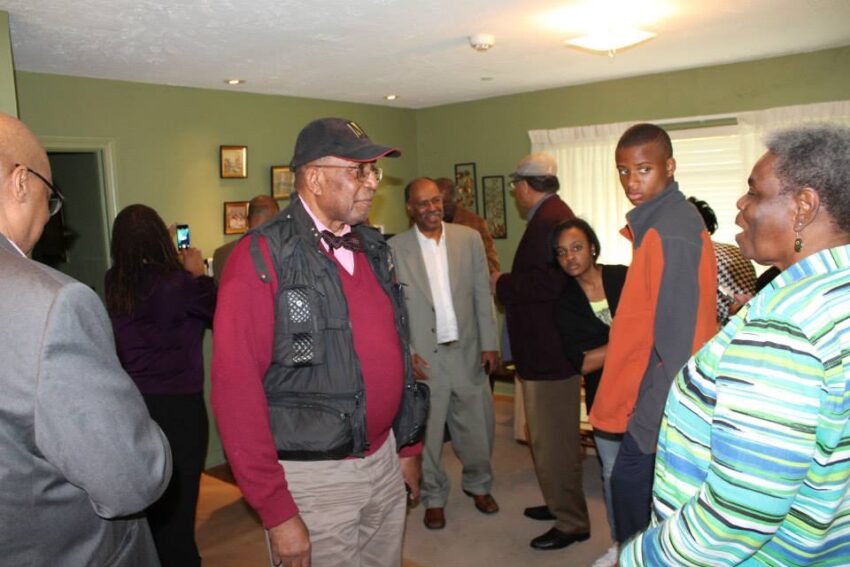
Some take their educative role seriously. Williams said column writing has “been a way to give voice to my experiences in my particular case as a Black Richmonder, who grew up there, knows the city, knows the people, and whose way of looking at things is informed by his perspective in a very particular kind of place, but also as someone who is educating people who acknowledge they don’t know stuff. . . . I’m not averse to educating people on what they should know about the experiences of their fellow citizens.”
It’s a role that the Pulitzer board valued. It chose Williams for “penetrating and historically insightful columns that guided Richmond, a former capital of the Confederacy, through the painful and complicated process of dismantling the city’s monuments to white supremacy.”
Black columnists who write for mainstream newspapers contend with such questions as whether they write too much about race, whether they are becoming predictable, and whether they can write what they choose.
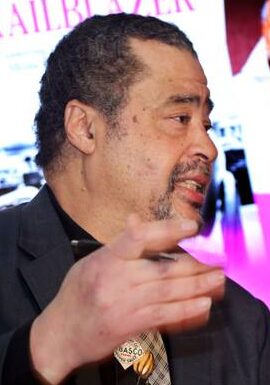 “If you’re asking whether I’m being censored, the answer is no,” said Milloy (pictured). “There’s this tension — your basic reading level is eighth grade. It’s probably dropped down. . . . You’re not going to put everything in a newspaper, there are other outlets for other things, if you will.”
“If you’re asking whether I’m being censored, the answer is no,” said Milloy (pictured). “There’s this tension — your basic reading level is eighth grade. It’s probably dropped down. . . . You’re not going to put everything in a newspaper, there are other outlets for other things, if you will.”
Williams said of “that predictable thing”: “I’ve never heard that asked of white columnists. Are you being too predictable? I think that’s kind of a code for ‘why don’t you think like I think’ for a change? And to hell with that. If people are — they come to us for that predictability. Each columnist has a voice; as Monroe says, you have a personality. You have a value system. If they think you’re going to be someone other than who you are, they’re deluding themselves. That’s what they come for. They come to hate on you, to disagree with you. That’s why they’re there. OK, if I’m predictable in that way, then so be it. That’s our brand, to get all corporate. That’s what we do.”
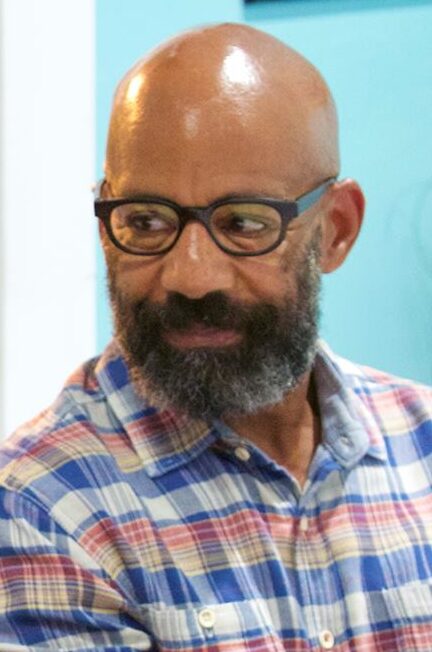 Blackistone (pictured) agreed. “I write for me,” he said. “I can be passionate, informed enough about a particular topic that I don’t stick my finger in the air to figure out which way the wind is blowing. I try to blow the wind myself. That’s not to say that I completely disregard the audience. . . . I know who my audience is. One of the things that I teach in each of my classes is the history of media in this country. It was founded for, by and controlled by the majority interests in this country, which is primarily white males. And I never lose sight of that, so I write for me.”
Blackistone (pictured) agreed. “I write for me,” he said. “I can be passionate, informed enough about a particular topic that I don’t stick my finger in the air to figure out which way the wind is blowing. I try to blow the wind myself. That’s not to say that I completely disregard the audience. . . . I know who my audience is. One of the things that I teach in each of my classes is the history of media in this country. It was founded for, by and controlled by the majority interests in this country, which is primarily white males. And I never lose sight of that, so I write for me.”
A columnist at the Dallas Morning News from 1990 to 2006, Blackistone gave the example of writing about Nelson Mandela in 1990. The anti-apartheid avatar, newly released from prison after 27 years, stopped in Dallas as part of his U.S. tour.
“The sports editor called me in and said, ‘Why you always writing this Black stuff?’ I explained to him, I said, ‘Dave,’ Dave Smith, legendary sports editor, ‘I’m not always writing Black stuff, it’s just that your readers haven’t seen someone write about some of these issues from the perspective of a Black man.’ “
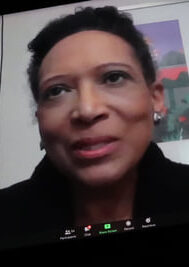 Added Curtis (pictured), “I don’t ever apologize for seeing things through a certain lens, because certainly, white columnists don’t do that at all. . . . You know, it’s not bad being the outsider. It just isn’t. And sometimes I do think — and Barbara put it so well — if you feel liberated, you’re not part of the club. And that makes it better. . . .
Added Curtis (pictured), “I don’t ever apologize for seeing things through a certain lens, because certainly, white columnists don’t do that at all. . . . You know, it’s not bad being the outsider. It just isn’t. And sometimes I do think — and Barbara put it so well — if you feel liberated, you’re not part of the club. And that makes it better. . . .
“I don’t want to worry about not being invited to the club, the in-places, the parties, the things, because in one sense I will always be an outsider. And as Barbara said, that is really not a bad place to be when you’re writing columns.”
Reynolds (pictured, below) invoked Oprah Winfrey. “I did an interview with Oprah once, and she was talking about trust your instinct, and trust yourself. And I think that guides me,” she said.
“Like Mary Curtis, when she was talking about — that hurt me so bad when [then-President] Trump talked about how Baltimore was a place rat-infested.
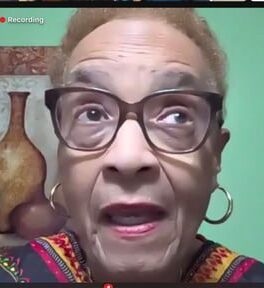 “It hurt me for children, because I thought about how children growing up would be taunted: ‘Oh, you’re from Baltimore, that rat-infested place’ — you know, sometimes I can get into a column when I can identify with the person who it hurts. Like now, since I am 80, I’m very sensitive to what happens to older people. And so, . . . like I think everybody else is saying, I identify with the struggling, the abused, the overlooked, the marginalized, because I understand all of it. As a Black woman, to be despised because you’re Black, and despised because you’re a woman, and told that you’re an opinion columnist, which I was for years, but then [have people] get upset because my opinion does not match the opinion of the white editors.”
“It hurt me for children, because I thought about how children growing up would be taunted: ‘Oh, you’re from Baltimore, that rat-infested place’ — you know, sometimes I can get into a column when I can identify with the person who it hurts. Like now, since I am 80, I’m very sensitive to what happens to older people. And so, . . . like I think everybody else is saying, I identify with the struggling, the abused, the overlooked, the marginalized, because I understand all of it. As a Black woman, to be despised because you’re Black, and despised because you’re a woman, and told that you’re an opinion columnist, which I was for years, but then [have people] get upset because my opinion does not match the opinion of the white editors.”
Reynolds also gave this example. “At USA Today, I was in a meeting once where they were talking about how Black youth were turning away from drugs more than whites because they had seen what it was doing to their communities. I was saying, ‘Oh, that’s great, that’s great.’ And when I picked up the paper the next morning, no one mentioned that Black youth . . . . were turning away from drugs. But because I was the columnist, that was my column!
“So we can just be who we are, just use our tastes, our instinct, to liberate ourselves, to liberate our people. I think it’s wonderful that we have the honor to have people like Askia and Ethel Payne and some of the great — Ida B. Wells — some of the great journalists that have come before us. We’re really liberators. At least we should be.”
- Donna Britt, Washington Post: Will Smith is human. So are we all.
- Jonathan Capehart, Washington Post: Will Smith didn’t slap just Chris Rock
- Stephen Crockett, HuffPost: It’s Been 4 Days Since The Oscars And I Hate That We’re Still Talking About Will Smith
- Howell Davies, the Sun, Britain: NETFLIX CHILL ON WILL: Will Smith biopic in chaos as Netflix and Apple pull out of bidding war after Oscars slap scandal
- Roxane Gay, New York Times: Jada Pinkett Smith Shouldn’t Have to ‘Take a Joke.’ Neither Should You. (March 29)
- Robin Givhan, Washington Post: Will Smith, spit-polished thuggery and disrespect
- Ryan Grim, the Intercept: Honor Culture Is Back. We Eradicated It for a Reason. Abraham Lincoln, Will Smith, and dueling. (March 29)
- Michael Harriot, the Grio: Sometimes, people get smacked
- Reggie Jackson, Milwaukee Independent: My problem with how the American public reacted to Will Smith Slapping Chris Rock
- Roy S. Johnson, al.com: Chris Rock was a beast in restraint; not sure I would have been the same
- Andrew Lawrence, Guardian: Chris Rock once defined a generation – but his shtick has aged poorly
- Aaron Morrison, Associated Press: Will Smith’s slap sparks debate on defense of Black women
- Melena Ryzik, Nicole Sperling and Matt Stevens, New York Times: A Slap Could Sting the Smith Family Brand
- Stephanie Sy with Eisa Nefertari Ulen and Mark Anthony Neal, “PBS NewsHour”: Slapping incident at Oscars sparks difficult conversations
- Baratunde Thurston, Puck: Will Smith’s Tragic Lesson (March 28)
- Tim Wise, medium: Will Smith, Chris Rock, and What You’re Missing About That Slap
To subscribe at no cost, please send an email to journal-isms+subscribe@groups.io and say who you are.
Facebook users: “Like” “Richard Prince’s Journal-isms” on Facebook.
Follow Richard Prince on Twitter @princeeditor
Richard Prince’s Journal-isms originates from Washington. It began in print before most of us knew what the internet was, and it would like to be referred to as a “column.” Any views expressed in the column are those of the person or organization quoted and not those of any other entity. Send tips, comments and concerns to Richard Prince at journal-isms+owner@
View previous columns (after Feb. 13, 2016).
View previous columns (before Feb. 13, 2016)
- Diversity’s Greatest Hits, 2018 (Jan. 4, 2019)
- Book Notes: Is Taking a Knee Really All That? (Dec. 20, 2018)
- Book Notes: Challenging ’45’ and Proudly Telling the Story (Dec. 18, 2018)
- Book Notes: Get Down With the Legends! (Dec. 11, 2018)
- Journalist Richard Prince w/Joe Madison (Sirius XM, April 18, 2018) (podcast)
- Richard Prince (journalist) (Wikipedia entry)
- February 2018 Podcast: Richard “Dick” Prince on the need for newsroom diversity (Gabriel Greschler, Student Press Law Center, Feb. 26, 2018)
- Diversity’s Greatest Hits, 2017 — Where Will They Take Us in the Year Ahead?
- Book Notes: Best Sellers, Uncovered Treasures, Overlooked History (Dec. 19, 2017)
- An advocate for diversity in the media is still pressing for representation, (Courtland Milloy, Washington Post, Nov. 28, 2017)
- Morgan Global Journalism Review: Journal-isms Journeys On (Aug. 31, 2017)
- Diversity’s Greatest Hits, 2016
- Book Notes: 16 Writers Dish About ‘Chelle,’ the First Lady
- Book Notes: From Coretta to Barack, and in Search of the Godfather
- Journal-isms’ Richard Prince Wants Your Ideas (FishbowlDC, Feb. 26, 2016)
- “JOURNAL-ISMS” IS LATEST TO BEAR BRUNT OF INDUSTRY’S ECONOMIC WOES (Feb. 19, 2016)
- Richard Prince with Charlayne Hunter-Gault, “PBS NewsHour,” “What stagnant diversity means for America’s newsrooms” (Dec. 15, 2015)
- Book Notes: Journalists Follow Their Passions
- Book Notes: Journalists Who Rocked Their World
- Book Notes: Hands Up! Read This!
- Book Notes: New Cosby Bio Looks Like a Best-Seller
- Journo-diversity advocate turns attention to Ezra Klein project (Erik Wemple, Washington Post, March 5, 2014)
When you shop @AmazonSmile, Amazon will make a donation to Journal-Isms Inc. https://t.co/OFkE3Gu0eK
— Richard Prince (@princeeditor) March 16, 2018

